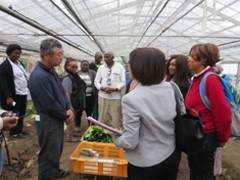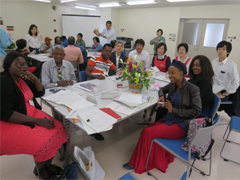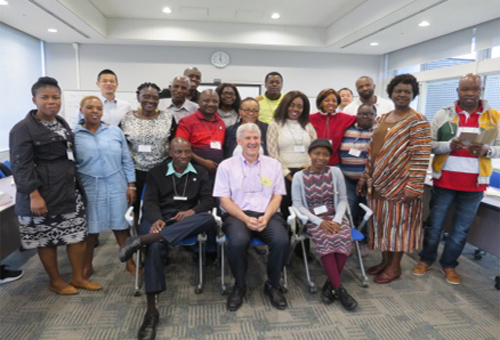This past May I had the opportunity to go to Kobe City, Japan to participate in a training program organized by the Japan International Cooperation Agency (JICA). The training, which lasted 20 days, was directly linked to my work in Jimma as a horticulture crop production expert at the Oromia Irrigation Development Authority (OIDA).
In January 2017, JICA launched its Smallholder Horticulture Farmer Empowerment project, commonly referred to as Ethio-SHEP, to equip smallholder farmers with the tools they need to increase their yields and to shift their mindsets from "Grow and Sell" to "Grow to Sell".
I have spent the last three years in Jimma working to scale up horticulture production within Jimma Zone, and when the opportunity arose to travel to Japan and take part in JICA's Knowledge Co-Creation Program I thought it was the ideal occasion to understand the challenges of horticulture cultivation, distribution and marketing.
Upon arriving at the Kansai International Center I received a thorough technical explanation about the SHEP approach. It is a holistic development approach which ensures that farmers receive various trainings to acquire agriculture and managerial skills that will grant them access to a competitive market. Traditionally, farmers grew whatever was available, or easy to grow, without particular regard to the market demand. However, with the SHEP Approach, farmers create networks in the marketplace and conduct surveys to determine the crop needs of the community and to find out the value of crops. After this, they are able to tailor the crops that they grow to meet the demand.
I learnt that the intensive technical support that my team provides to farmers can help them increase their productivity and quality, which I am already witnessing in two farmers groups in Dety-Duke and Birbisa areas. The two groups have been able to harvest 540kg/100m2 of tomatoes and 122kg/100m2 of green peppers, respectively.
My time was also spent learning new methods such as bokashi composting, which is a Japanese method of turning food waste into compost. Additional instruction was provided on soil sterilization, crop pest and disease control mechanisms, and women's empowerment. However, the most impactful aspect of my training was learning about the theoretical base that the SHEP Approach is built on. SHEP raises the intrinsic (internal) motivation of farmers to guarantee that the necessary activities for success are continuously implemented. Based on the theory of self-determination, three psychological needs motivate people: autonomy - farmers need to feel in control of their goals, which they are able to do by going into the marketplace and interacting with other farmers and consumers and deciding what they want to grow; competence - farmers learn different skills and gain mastery through the trainings provided by the Ethio-SHEP project; and relatedness - farmers experience a sense of belonging and attachment to their farmer groups and their communities through increased interactions and the Farmer Business Linkage Forums are discussion spaces for famers with buyers, brokers, processors, transporters, extension service providers and financial institutions.
Before going to Japan, I always questioned why JICA was not simply providing the farmers with financial assistance, why were they going to the trouble of training all these farmers? Now I am able to understand how technical assistance is far more impactful than financial aid alone. When employing the intrinsic motivation approach, people act based on their internal feelings and interests and do not do things for fleeting social and psychological satisfaction; they do it for sustainable mental and physical satisfaction. I believe this is good; I have seen a couple of organizations that have provided financial assistance for the community I work with, and the people are happy for a short time, until the money runs out, and then they are back in the same position again.
Hence, I have understood that we need sustainable methods for development and the SHEP Approach is a good method for farmers to learn. My commitment to serving my community has been raised and I have learnt a lot of time management tools, as well as planning and management skills, which will help me implement market-oriented agriculture promotion with the farmers.
Mr. LIGDI Abate Kedida is a counterpart personnel of the Smallholder Horticulture Farmer Empowerment project (Ethio-SHEP) and participated in a JICA's Knowledge Co-Creation Program "Market-oriented Agriculture Promotion (Planning and Management)" in Japan and Kenya together with other participants from African countries in 2017.

Field visit to a local farmer in Kobe city

Discussion with local resource persons

Group photo with program facilitators





scroll